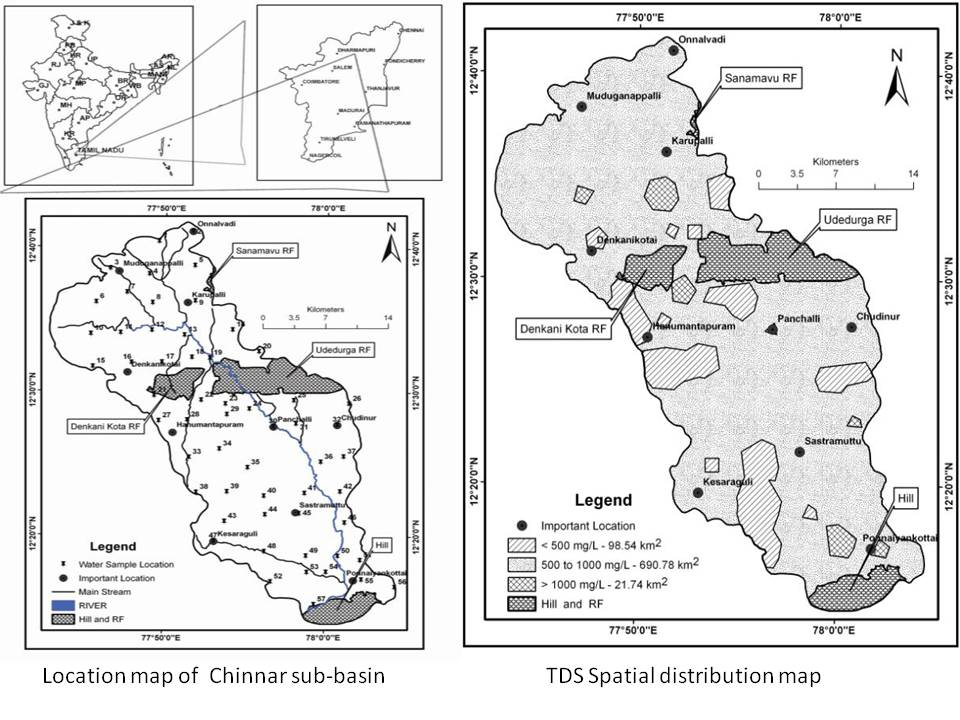Kaveri
Rain rain go away, our cities can't keep the water at bay!
Posted on 17 Jun, 2013 06:32 PMBreaking news! The monsoon is here! It hit Kerala on June 1 and with that put an end to newspapers stories on drought in India highlighted by pictures of farmers standing on cracked earth and staring up at the sunny skies. However, very soon there will be Page-1 picture spreads of water-logged cities with traffic jams and harried people titled "The city is drowning"!

Delhi’s draft water policy released - Roundup of the week’s news (January 21 -27, 2013)
Posted on 28 Jan, 2013 08:14 PMDelhi’s draft water policy
Moving from paddy and sugarcane to less water-intensive crops such as oilseeds, pulses and millets can help resolve the Cauvery water dispute
Posted on 14 Jan, 2013 12:10 AMWhat happens when two or more states are dependent on same water resource for agricultural purposes ? Do the states compete for the resource or are their needs sufficiently different from each other? What are the consequences of the competition for this precious resource?
This article sheds light on the dispute between Karnataka and Tamil Nadu, for sharing Cauvery river water. The ongoing tussle between the two states has seen a lot of unrest amongst farmers in form of dharnas, protests, rail roko and non-cooperation by citizens, and disagreement with the agreements made by their respective governments and unending negotiations by governments involved, to come to a mutually agreeable decision.
Punjab chief minister objects to draft national water policy - Roundup of the week's news (December 31 – January 6, 2013)
Posted on 08 Jan, 2013 08:03 AMObjection raised to National water Policy
Evaluation of physico-chemical characteristics in groundwater using GIS – A case study of Chinnar sub-basin, Cauvery River, Tamil Nadu, India
Posted on 20 Jan, 2012 04:26 PMThe study found that the groundwater of the basin is extremely hard with total hardness, magnesium and potassium contents being above the permissible limits. Thirty nine out of 57 samples exceed the allowable limits for fluoride.

GIS based rainfall-runoff modeling for Hemavathy catchment – A research report by National Institute of Hydrology
Posted on 29 Jul, 2010 09:19 PMThe report deals with Geographical Information Systems (GIS) based rainfall-runoff modeling using Topography Model (TOPMODEL) for the Hemavathy catchment of Cauvery basin in Western Ghats of Karnataka. The TOPMODEL is a variable contribution area model in which the predominant factors determining the formation of runoff are represented by the topography of the basin and a negative exponential law linking the transmissivity of the soil with the vertical distance from the ground level.
Water quality status of rivers Tungabhadra, Cauvery and Kabini - KSPCB (2007)
Posted on 12 Jun, 2010 01:36 PMThese two documents from the KSPCB website, provide monthly water quality status data, for the rivers Tungabhadra, Cauvery and Kabini, monitored between January to June 2007, at various points along the rivers.
The data recorded are Temperature, pH, Dissolved Oxygen (DO), Biochemical Oxygen Demand (BOD), Chemical Oxygen Demand (COD) and Faecal Coliform.
More rain water needed for the east flowing rivers of South India
Posted on 25 Apr, 2010 01:58 PMSIMPLE & EFFECTIVE Method to increase WATER to east flowing RIVERS of SOUTH INDIA.
WESTERN GHATS are the mighty walls created by the nature.
Impact of climate change on river deltas and other coastal areas in India
Posted on 26 Aug, 2009 04:23 PMThe effects are most visible in the Sunderbans. Literally the 'beautiful forest', these wetlands at the mouths of the Ganga and Brahmaputra river systems are among the largest mangrove forests in the world. About 62% of this area of some10000sq km lies in Bangladesh but there is a significant Indian portion in the state of West Bengal.
Map: Location of water resource projects across river basins in India
Posted on 20 Aug, 2009 03:23 PMThe map indicates that across the main 19 river basins of the country, water resource projects with a total live storage of 174 BCM (Billion Cubic Metres) have been completed, 75 BCM are ongoing, and 132 BCM are being planned.